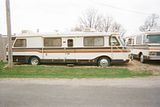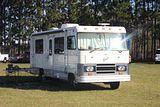Go to...  | Start A New Topic  | Search  | Notify  | Tools  | Reply To This Topic  |  |
 |
Eccomodder has a recent discussion about alternator usage which some should pursue.. http://ecomodder.com/forum/sho...r-relaxer-34919.html _________________________ The 82 MCC {by Barth} is not an rv-- it is a Motor Coach!! | ||
|
Official Barth Junkie |
I disagree: This seems to be asking for trouble. If your alternator is not charging properly, why not replace the regulator instead of cobbling up a way to trick it into shutting off? This mod is designed to allow charging only when coasting, like hybrid cars do. Motorhomes do not coast that much except in stop and go traffic. I have never seen any signs of overcharging with the modern OEM regulators. In extreme hot climates (like South Africa) overcharging and gassing off the electrolyte can be problems. With a small vehicle like a car or van without coach batteries, maybe this mod could help. The claim of (up to)10% mileage improvement sounds way optimistic to me. For coaches that have multiple batteries in cooler climates I would hesitate to do anything to reduce the charging output. Considering the weight of a coach I would be surprised if any mileage change would be noted. Bad idea, IMHO. (How about a relaxer for the driver?) 9708-M0037-37MM-01 "98" Monarch 37 Spartan MM, 6 spd Allison Cummins 8.3 325+ hp | |||
|
I certainly disagree! When I first start the Cummins, only the chassis batteries are getting a charge from the alternator, about 2-3 minutes later the paralleling relay closes and then the alternator is charging all the batteries. The engine is loaded and you can hear the slight reduction of RPM. My alternator depending on the state of discharge of the batteries will go to 13.3 VDC. Running down the road the voltage will climb to 14.2-14.5 VDC after a period of time the voltage will settle to around 13.7 VDC. At this point the batteries are 80%-90% charged. The amount of current the alternator is producing to maintain 13.7 VDC is only the amount of current needed by the rest of the systems (chassis-house) and the amount of current going to the batteries is very low. Batteries that are being charged by a single point regulation system will never reach full and complete charge with a 13.7 VDC regulated alternator. Watching my 3 stage charger work with low house batteries will show 160 A for 4 hours, during that time the current to the batteries will drop to about 40-60 A and the voltage will rise to 14.2 VDC. This is the bulk charge mode and the time is programmable depending on the total size of the battery bank. The charger will then go to the absorption mode where the voltage will be reduced to 13.8 VDC. From this point the voltage is held constant and the current draw of the batteries will to drop. Once the current draw reaches somewhere around 20 A the charger will switch to float mode. The charger will hold 13.2-13.3 VDC and the current will continue to be very low. If there is any load on the batteries, the charger will ocasionally switch to 13.7 VDC to replenish what was drawn from the batteries. The reason for all these words is to explain why this idea is severely wrong. If I have a reasonable charge on the battery system, if I were to modify the regulator to go to 14.2 VDC on command, the increased alternator current would be very small. Maybe 15-20 amps for a short period of time. Yes any resistive load on the system would also draw more current but again it is very small. In a 12 VDC system 20 to 30 amps is 240 to 360 watts! Hardly this type of load change would not cause any noticeable dynamic braking and certainly no measurable MPG improvement. If this application were applied to a micro car with a super small engine I could see some efficiency improvement. Certainly not in a pickup truck or RV. If any of these ideas had merit, you would find them installed in new vehicles and certainly a big aftermarket following. Talk to me about air tabs! Ed 94 30' Breakaway #3864 30-BS-6B side entry New Cummins 5.9L, 375+ HP Allison 6 speed Spartan chassis K9DVC Tankless water heater | ||||
|
 |
Some people seem to like them..your view??? _________________________ The 82 MCC {by Barth} is not an rv-- it is a Motor Coach!! | |||
|
Captain Doom |
The alternator has a built-in "relaxer". Under heavy electrical load, it takes more effort to spin the alternator. Under light loads, much less. IMHO, the "relaxer" is a solution in search of a problem. Rusty '94 28' Breakaway: MilSpec AMG 6.5L TD 230HP Nelson and Chester, not-spoiled Golden Retrievers Sometimes I think we're alone in the universe, and sometimes I think we're not. In either case the idea is quite staggering. - Arthur C. Clarke It was a woman who drove me to drink, and I've been searching thirty years to find her and thank her - W. C. Fields | |||
|
I noticed no increase in MPG, I did notice a very slight improvement in buffeting by passing trucks and a very slight improvement with the crap forming on the rear, stays a bit cleaner. Later talking with truckers, lots of them, they all agree not worth the cost. I also have noticed very few trucks have them installed on their rigs. They will have under trailer deflectors, wheel covers and "trailer tails". I think that speaks for what works and is cost effective. Ed 94 30' Breakaway #3864 30-BS-6B side entry New Cummins 5.9L, 375+ HP Allison 6 speed Spartan chassis K9DVC Tankless water heater | ||||
|
 8/19 8/19 |
From "alternator relaxer" to "air tabs." I cannot argue the point better than MWrench- well said ED! Some thought on the alternator: Turn your fog lights OFF during the day on your rig. At night use the fog lights in the fog only. Older fog lamps are about 55 watts each, and newer LED fog lamps still draw about 15 watts each. trun off other unnecessary accessories. Some thought on air tabs: Slow down. Less wind resistance is at slower speed. Rear protruding air tabs will create a grey area for trailers already 53 foot long, by adding length to the trailer. It depends how one reads the law, depending which state you are traveling through. | |||
|
 8/19 8/19 |
| |||
|
Glassnose Aficionado |
About the alternator, if I wear the battery down a bit while starting, the belt will squeal when the engine finally starts, then after a few seconds to quite a few, it will stop squealing, telling me 1]- I need to tighten the belt, and 2]- The battery is sufficiently back to snuff and the alternator is not working as hard any more. 79 Barth Classic | |||
|
Yes to both. 1993 34 Regency WB 8.3 Cummins 300HP | ||||
|
| Powered by Social Strata |
| Please Wait. Your request is being processed... |
|
This website is dedicated to the Barth Custom Coach, their owners and those who admire this American made, quality crafted, motor coach.
We are committed to the history, preservation and restoration of the Barth Custom Coach.
We are committed to the history, preservation and restoration of the Barth Custom Coach.